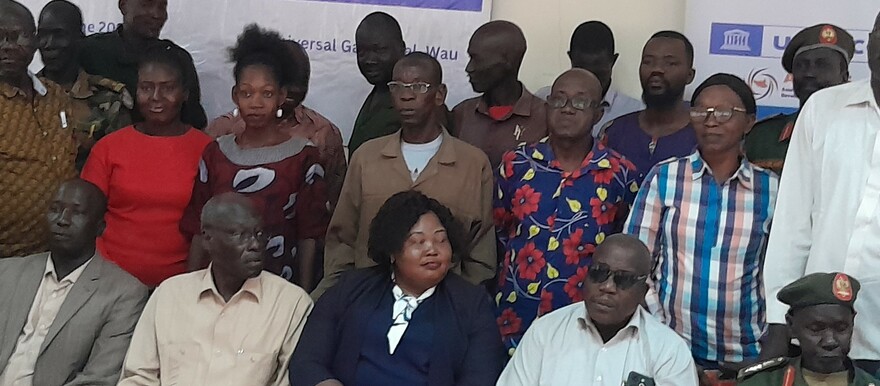A three-day training workshop for security agencies and journalists began on Tuesday in Wau town, focusing on the roles of journalists, media framework, access to information, and journalists’ safety.
Participants include members of the South Sudan People’s Defense Forces, the National Security Service, the police, and journalists from various media houses and freelancers.
The training educates security agencies on the international legal framework for freedom of expression and media laws, including the 1945 International Covenants, the continental charter, and regional conventions. It also covers South Sudan’s national legal framework, specifically the Media Authority Act 2013 and the Right of Access to Information Act 2011, and addresses limitations such as privacy rights and defamation.
Key topics include journalists’ safety, protection, prevention, prosecution, media and security roles during the upcoming elections, journalistic ethics, and countering hate speech, misinformation, and disinformation during and after the elections.
During the opening remarks, Paul Night, UNESCO Communication and Information Assistant, emphasized that the workshop aims to establish a strong framework and foster a good relationship between the media and the security sector.
“This workshop focuses on the legal framework and the importance of access to information and freedom of expression. That is why we are here today with our colleagues from AMDISS,” said Night.
“We encourage all security personnel, including those who have not attended this workshop, to understand that freedom of expression and access to information are fundamental rights that must be respected by everyone, including men and women in uniform,” he added.
Night highlighted UNESCO’s mandate to advocate for a robust media landscape globally and in South Sudan. He noted that the organization is working diligently to build the capacity of journalists and media houses in the country.
“UNESCO is dedicated to advancing the media landscape worldwide. In South Sudan, we are focused on building the capacity of journalists and media houses to ensure accurate reporting and free access to information,” Night stated.
“As we move forward with this three-day training, let us remember that freedom of expression and access to information are key factors in our work. Security personnel must understand that everyone, including citizens, has the right to express themselves and access information,” he added.
David John Jongo, the Director General in the Ministry of Information in Western Bahr el Ghazal state, welcomed the training. He also thanked the National Security Service in Western Bahr el Ghazal state for maintaining a good relationship with media houses over the past few years without intimidation.
“This is a great opportunity to thank our colleagues in National Security for their understanding of journalists’ work. Over the past period, no journalist has been arrested by security forces, which clearly shows their understanding of journalists’ roles,” said Jongo.
“I personally thank National Security for their good work. Let us continue to work together. Our work in the media relies on you, especially the organized forces. As you can see, this training has brought together journalists and security personnel,” he said.
“Freedom of expression is very important, and journalists must work hard to ensure that our local population receives clear and accurate information,” he continued.
“These days, people are talking about elections, and it is up to you, the journalists, to inform our citizens. If you do not play your role, our people will not understand the election process. This is why today’s training is so important for you to understand your role,” he added.
Jongo cautioned journalists against involving themselves in politics or associating with politicians. “I often see journalists associating with politicians, and it is not appropriate for journalists to get involved in politics. Those who do are not doing the right thing because they will not be able to deliver clear information to the public,” he said.
Some journalists expressed their satisfaction with the workshop, especially as the country approaches elections.
Alor Deng emphasized the need for cooperation between journalists and the security sector. “This workshop is timely because we know that the country is likely heading for elections by the end of this year,” said Alor. “We want this training to help us understand the importance of each duty. The coming period will be challenging, and we need to know each other’s roles.”
“We need our brothers in national security to allow us to do our work without intimidation, just as they do theirs,” he added.
Another journalist, Saferin Dayia Tom, highlighted the workshop’s importance due to ongoing issues between soldiers and journalists. “As a journalist, I see the importance of this workshop because there are many problems between security agencies and journalists. Sometimes, if there is a mistake in a story, they do not follow appropriate procedures; instead, they act by arresting journalists, which is not the rightful way,” said Saferin.
“The importance of this training is to foster cooperation between security and journalists, and for the security personnel to understand each duty,” she added.
The workshop is being run by AMDISS with support from UNESCO.




